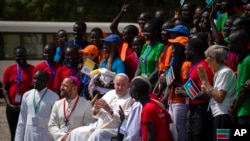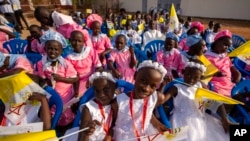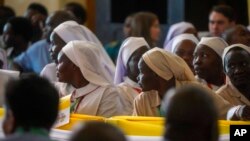Pope Francis sought Saturday to console the long-suffering people of South Sudan as he opened his first full day in a country beset by conflict, poverty and humanitarian crises by encouraging priests and nuns to serve their flocks by joining in their tears.
After arriving in the world’s newest country on the first-ever papal visit Friday, Francis was spending Saturday ministering first to church personnel and then to South Sudanese who have been forced by fighting, flooding and other crises to leave their homes.
Francis was highlighting in particular the plight of South Sudanese women, half of whom are married before age 18, are subject to rampant sexual violence and then face the world’s highest maternal mortality rate.
“Let us ask ourselves what it means for us to be ministers of God in a land scarred by war, hatred, violence, and poverty,” Francis said in St. Theresa Cathedral in the capital, Juba. “How can we exercise our ministry in this land, along the banks of a river bathed in so much innocent blood, among the tear-stained faces of the people entrusted to us?”
Lush in oil and other natural resources but beset by years of civil war and conflict, South Sudan is one of the world’s poorest countries and is responsible for Africa’s worst refugee crisis: More than 2 million people have fled the country and another 2 million are displaced within its borders.
Joined by Archbishop of Canterbury Justin Welby and the Presbyterian head of the Church of Scotland, Francis is seeking to draw global attention to the country’s plight.
The aim of the novel ecumenical visit is to encourage South Sudan’s political leaders to implement a 2018 peace accord ending a civil war that erupted after the overwhelmingly Christian country gained independence from mostly Muslim Sudan in 2011.
The deal and many of its key provisions, including the formation of a national unified army, has stalled amid political infighting and continued clashes around the country that have forced the postponement of the first presidential election for another two years.
At the cathedral Saturday, Francis urged South Sudan’s bishops, priests, nuns and seminarians not to join religious life for social prestige, but to serve their flocks by accompanying them.
“It is precisely this art of stepping into the middle of our brothers and sisters that the church’s pastors need to cultivate: the ability to step into the middle of their sufferings and tears, into the middle of their hunger for God and their thirst for love,” he said.
On a day when South Sudan’s suffering women are expected to take the pride of place, Francis heard of the horrific sacrifices some nuns have made. Sisters Mary Daniel Abut and Regina Roba Luate of the Congregation of the Sacred Heart Sisters were killed in a 2021 ambush along with two others.
“Thank you, on behalf of the entire Church, for your dedication, your courage, your sacrifices and your patience,” Francis said.
Women and girls in South Sudan live a “hellish existence,” the United Nations Commission on Human Rights in South Sudan said in a report last year based on several years of interviews.
“South Sudanese women are physically assaulted while being raped at gunpoint, typically held down by men while being abused by others. They are told not to resist in the slightest way, and not to report what happened, or they will be killed,” the report said.
“It’s hard to convey the level of trauma of South Sudanese women whose bodies are literally the war zone,” commission chair Yasmin Sooka said late last year.
In his arrival speech Friday, Francis raised the plight of women and called for them to be protected and promoted.
Among those on hand for his visit to the cathedral on Saturday was Sister Regina Achan, who said Francis’ visit would encourage other sisters to keep serving.
“We stand with them because we are their voices, we don’t run away at difficult times,” said Achan.
Francis’ visit, she added, would awaken “serenity and peace in our hearts that we may work for peace and justice in this country.”
Francis issued a blunt warning on Friday to President Salva Kiir and his onetime rival and now deputy Riek Machar that history will judge them harshly if they continue to drag their feet on implementing the peace accord.
Kiir for his part committed the government to return to peace talks — suspended last year — with groups that didn’t sign onto the 2018 accord. And late Friday, the Catholic president granted presidential pardons to 71 inmates at Juba’s central prison in honor of the ecumenical pilgrimage, including 36 on death row.
Francis has changed Catholic Church teaching to hold that capital punishment is inadmissible in all circumstances.






